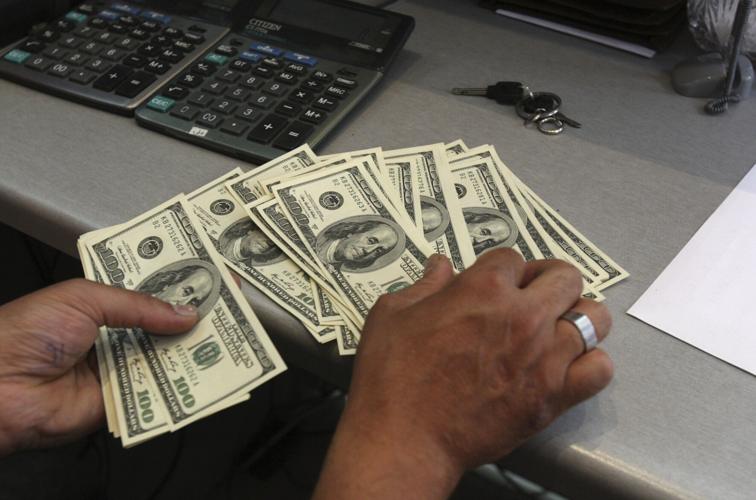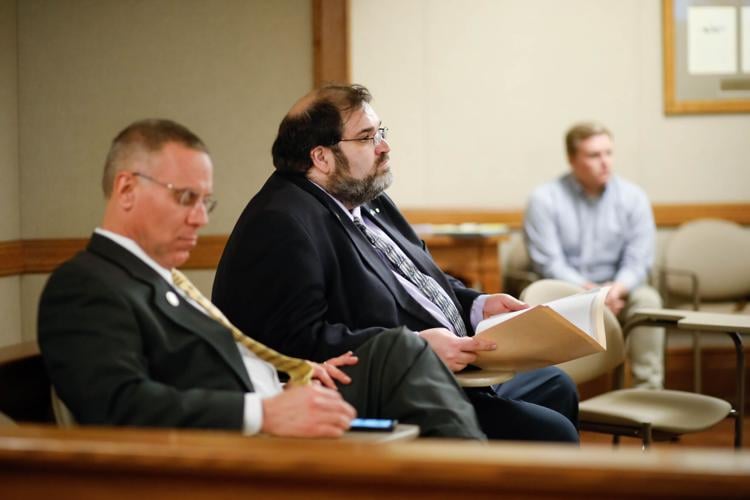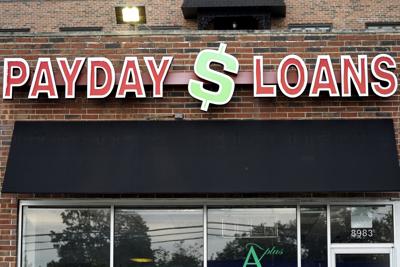Initially, payday loans didn’t seem so bad to Elea Pedroza.
She didn’t have a bank account at the time and needed a quick infusion of cash to pay her rent. She didn’t think much about going to Check Into Cash, a national chain that had a branch near her home in Waukesha.
“It was just like, oh, you know, you give them a little bit more money, but they'll give you the money when you need it,” Pedroza said.
Payday loans are short-term loans, often of several hundred dollars or less, designed to help the working poor fix a car, pay rent or cover a utility bill when they’re short on cash.
Her case is why proponents of payday loans see them as filling a need: providing access to loans for people whose credit scores are too low to receive other types of financing. Pedroza’s experience was made possible by a longstanding lack of payday loan regulation in Wisconsin — and also underscores why many find the system to be predatory.
After paying off her first loan without much of a problem, Pedroza and her husband didn’t hesitate to turn back to Check Into Cash when she needed money again.
She found the service friendly and, this time, she was informed that she was eligible for a more generous loan.
But when Pedroza lost her job, she was unable to repay the loan on time and ended up scrambling as the high interest rate caused her debt to compound. Paying off an $850 loan meant shelling out over $1,200 — and data showed that Pedroza was lucky compared with other payday loan borrowers, who can pay over twice the original amount when interest and fees are factored in.
Eventually, she found another job and was able to slowly but surely chip away at the payments, a process that culminated in her being debt free, starting in late February. But she said the year and a half it took to repay the amount was one of the most stressful things she had ever encountered.
“I definitely told myself that I’m going to steer clear of payday loans,” she said. “As much as I know other people might need a payday loan like that, right off the bat, it definitely is something that can become financially dangerous.”
Payday loans are criticized for catching people up in a cycle of struggling to pay off their loan and, in some cases, taking out more payday loans to pay off past borrowing.
After years of effort, however, attempts to regulate the industry have lost steam in the Wisconsin Legislature. Pro-regulation advocates say it has gotten to the point where payday lenders, once a formidable influence in the Capitol, with over two dozen lobbyists at their disposal, no longer feel the need to marshal much opposition to any efforts to limit their activities.
Observers say it is a reflection on how issues affecting Wisconsin’s poor are treated in the Legislature, while others are pushing to come up with solutions to residents’ payday lending quagmires that don’t involve legislative action.
“From a public policy perspective, this is where I think our state Legislature has an obligation to do better for people,” said Julie Bennett, CEO and executive director of the Society of Saint Vincent de Paul in Madison. “The understanding that a loan like this can take more than half of someone's income and that is allowable. That is not allowable for banks to do that. But it's allowable for places like this to do that. That's unconscionable to me.”

Nearly one-fifth of Wisconsin residents who took out payday loans last year defaulted, according to state data.
How payday loans work
To obtain a payday loan, a person will get the money upfront while depositing a check with the lender, to be cashed after a certain point, which is often when a customer gets paid. Other types of lenders licensed by the state are not generally allowed to offer loans for less than 90 days.
In 2023, the Wisconsin Department of Financial Institutions reported that the average payday loan taken out was $350, with the average interest and fees coming to $90. If a person had two weeks to repay the amount, the annual interest rate would come out to over 600%. By comparison, the average annual percentage rate on a 24-month personal loan is about 12.5%.
While about half of all payday loan borrowers in the state repaid their loan on time in 2023, nearly one-fifth of borrowers defaulted. Dozens more had to take out an additional payday loan to repay the original.
Lenders maintain they incur significant risk by loaning money to people who are less certain to repay the money on time. To compensate, they will charge much higher interest rates.
The payday lending industry itself has lost traction in Wisconsin in recent years. The number of loans peaked in the 2000s, with over 255,000 issued in 2011 alone. In 2023, the number of payday loans dropped precipitously, to just 3,700.
But all the while, the industry has shifted toward other tools, a response to increased regulation in other states that have shut the door on payday lending.
Those products are called installment loans and have become more widespread in states that have cracked down on the payday lending industry, as well as those that have not, such as Wisconsin. Unlike a payday loan, which requires a lump sum payment, installment loans work like they sound — a person makes a monthly payment over a set amount of time.
While the total number of installment loans in Wisconsin has also dropped in recent years, the total dollar amount doled out has increased and the average loan amount has also swelled to over $1,200, twice what it was a decade ago.
How regulation attempts faltered
In 2010, lawmakers seemed to be on the cusp of summiting a mountain they had been unable to climb for years: meaningful regulation of the payday lending industry.
Lawmakers were set to vote on a bill to regulate the industry, including a restriction on the interest rates that could be charged on a payday loan intended to limit how much a borrower would need to repay.
At the time, Wisconsin was the only state that lacked any meaningful regulation of the industry. But the most significant part of the bill — the rate cap — was struck late in the legislative session, much to the disappointment of consumer advocates.
“Their (payday lenders’) potential to influence elections and campaign contributions moved enough people to water it down,” said Robert Kraig, executive director of the consumer and policy advocacy group Citizens Action Wisconsin.
As the pared down version of the bill passed, there were still hopes it could serve as a major development. For the first time, the total amount a person could borrow from a payday lender was limited based on a person’s income, and the practice of delaying repayment of a loan in exchange for a fee was also restricted.
Gordon Hintz, a former Democratic legislator from Oshkosh who took the lead on payday lending reform while serving in the Legislature, recalled the push for the 2009 bill, when scores of lobbyists descended on the Capitol to weigh in and urge less regulation.
But that outward show of influence has waned over the years.
In Wisconsin, groups that lobby for or against bills have to track their activities. In the 2009-2010 session, the bill to regulate the payday loan industry garnered over 1,200 hours of lobbying from 18 interest groups, the bulk of whom represented the payday lending industry.

Sen. Andre Jacque, R-De Pere, is among state legislators trying to keep pressure on what he calls "predatory lending" in Wisconsin, but most proposed bills have died in committee.
Data compiled by the Wisconsin Democracy Campaign, a good government group, found at the time that groups spent over $669,000 on lobbying activities related to the bill.
Fast forward to the 2021-2022 session, when legislators introduced a bill to implement a rate cap, the idea that was jettisoned more than a decade before. Then, only 144 hours of lobbying energy were expended, with less than half of that coming from industry lobbyists. The remainder of the lobbying efforts came from groups seeking in vain to enact the regulations, though the bill ultimately failed to even get a hearing.
“I think they felt pretty comfortable that nothing's going to happen on the issue,” Hintz said.
A bipartisan group of legislators has not given up in a bid for change. Legislation introduced by Sen. Andre Jacque, R-De Pere, and Rep. William Penterman, R-Columbus, would impose a 36% annual rate cap on all payday loans, which would mirror the types of reforms put in place in Minnesota and other states.
A separate bill from Sen. Rachael Cabral-Guevara, R-Appleton, and Rep. Scott Allen, R-Waukesha, would expand the definition of a payday loan, allowing it to be paid off in installments, like other types of loans, and require lenders be more transparent about how much a person might pay in interest.
Republicans and Democrats have backed both bills but, during the most recent legislative session, neither measure moved out of committee. Rate cap legislation has been introduced in recent sessions with similar results.
During a hearing on Cabral-Guevara and Allen’s proposed bill, an advocate for the legislation pointed to a college student she worked with who had to pause her education to pay off a payday loan.
But legislators appeared skeptical of the notion that the government should insert itself into lending decisions.
“We just keep doing things to dumb down society and take lessons away, and if she would have never taken out a payday loan, she never would have learned from her mistake, so to speak,” said Sen. Mary Felzkowski, R-Irma.
A case for keeping up the pressure
The high interest rates were nothing more than “predatory lending,” Jacque said, and he pointed to the adverse effects on the mental health of Wisconsinites who wind up having to pay off their debts.
He acknowledged the presence of lobbying groups that have connections with both sides of the aisle. Lobbyists representing payday lenders are often former lawmakers or top legislative staff, representing both political parties.
But Jacque said it’s important to keep the issue visible.
“I think it makes it harder to ignore the issue if there's something out there that would fix it,” he said. “Rather than if there's just no attempt at all to to make any sort of a change in this session.”
But limiting the rate cap could effectively kneecap the payday loan industry in Wisconsin, making it not very profitable to offer those services. Even those who believe these loans are predatory acknowledge that banning them would not solve the problem entirely.
Payday lenders maintain that their products fill a gap in the system, which restricts access to capital for people with low or no credit scores.
A review of Illinois’ 2021 rate cap found that the policy restricted access to credit for poor people and pushed them toward installment loans and other types of products.
Other researchers have criticized the methodology of that study. But it outlines the case the payday loan industry makes against greater reform.
Julie Townsend, vice president of government affairs for the parent company of Advance America, told Michigan lawmakers that if they imposed a 36% rate cap it would drive payday lenders out of the state.
“It raises some concerns about where do people access credit if it’s not available to them from a licensed, regulated lender in their state?” Townsend said.
Doing away with payday loans wouldn’t necessarily change the reality of being poor in Wisconsin, experts note.
“I will say that it doesn't look like demand for small-dollar loans is ever going away,” said Melody Harvey, an assistant professor of consumer science at the University of Wisconsin-Madison. “So it may be a matter of finding a solution where consumers can receive these small-dollar loans at a cost that isn't prohibitive, or burdensome.”
The biggest barrier to enacting this type of law, according to regulation supporters, is not groups lobbying in opposition but instead the fact that the issue often flies under the radar because of who takes out these loans.
The thousands of Wisconsin residents who use payday loans are not generally the type of outspoken activists who will testify at committee hearings, hold large-scale rallies in the Capitol rotunda or visit one-on-one with lawmakers, Hintz said.
“If you get burned by a payday lender, you don't really want to talk about it,” he said. “Usually, there's shame and guilt involved — you've got to go to a friend or family, maybe you lost your home. Most people don't think twice, they just know that you don't go to those places (payday loan stores), they drive past them.
“So there isn't an active constituency out there that is demanding action on it.”

The payday lending industry has been so sheltered from strict regulation in Wisconsin that it spent very little time lobbying in the state Capitol in recent years, according to government-tracking reports.
‘We have the exact same story’
Afra Smith is well aware of the realities of having to rely on payday loans to get by.
She calls the feeling “survival mode,” where people will shrug off conventional wisdom when it comes to consumer finance because they need to address their basic needs.
In her case, the financial pressure came from a mountain of student loan debt, which loomed large even as she accepted a well paying job in the business world. To make herself more marketable, she then went back to school, adding to the debt burden — a situation that was compounded when she was passed over for a much-needed promotion.
She eventually turned to payday loans and, when she found she couldn’t pay off the first one, kept going back for more. It got to the point where she was effectively cut off from the formal banking system, denying her a checking account and the ability to access even a payday loan.
“I always felt a lot of shame and guilt around what I had done to myself,” Smith said. “I’m completely accountable for it, but I think in being ashamed what I didn’t realize until my story came out was that people around me use the exact same system. We have the exact same story but we just weren’t talking about our reliance on it.”
Smith got her finances sorted out and, in the process, wanted to help others do the same. She started the Melanin Project, providing one-on-one financial coaching and group seminars to help people, particularly Black women, improve their banking and credit habits.
“That’s a very common conversation that I have, through my story, that resonates with people, that brings them in (saying) ‘I have payday loans, can you help?’” Smith, who also works as a diversity, equity & inclusion consultant for UW Health, said. “I think that trying to get people to see a different route and a means of living and moving from a survival mode to a thriving mode — that economic mobility piece becomes a critical component of my work.”
In December, Wisconsin became the 24th state to require a financial literacy course for high school graduation. And while Constance Alberts noted that consumer education is important, so too is educating financial institutions.
The nonprofit group she leads as CEO, Bank on Greater Milwaukee, works with local banks and credit unions to offer products and support for those who have a hard time accessing banking services — and who might otherwise take out a payday loan.
Alberts has tried to make the argument that extending a helping hand can benefit banks as well.
“The longer a person is with a financial institution, the more likely they are going to come to you when they want that credit card, when they want that car loan, when they want that home loan, when they want that business,” Alberts said. “They're going to come to you because you were there to give them this opportunity in that short time period.”
But legislative inaction on regulating payday loans has forced individuals and nonprofit groups to come up with their own solutions.
St. Vincent de Paul, for example, set up a microloan program last year targeting people in need. The loans are up to $2,500 and are offered through the Bank of Sun Prairie, with the money going directly to a car repairman, landlord or other creditor whom a borrower needs to pay off.
As of this spring, 12 loans totaling over $18,000 have already been issued and all involved are current on their payments, Bennett said.
But there are barriers to accessing the program that St. Vincent didn’t foresee. For instance, banking regulations exclude people who spend a certain percentage of their income on housing from accessing the loans — a problem in the Madison area, where rising rents have slammed workers.
Indeed, the fallout from the limited housing for lower income residents in Dane County is likely to mean the situation will get worse for the working poor. Bennett said more residents have been pushed to the brink.
She recalled a story involving her daughter, who was a student teacher in college and attempting to work a job on the side to pay the bills. Driving home, she hit a deer and asked for a loan from her parents to get her car repaired quickly.
Not everyone, Bennett noted, had that type of safety net.
“The problem is not people not trying hard enough,” she said. “The problem is not people spending unwisely.
“The problem is people don't have enough money.”








